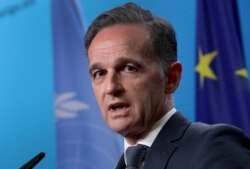Germany’s foreign minister said Monday a coordinated response from the European Union (EU) is needed to prevent a new strain of the coronavirus from spreading outside of Britain, where it was recently discovered.
Speaking in Berlin, Heiko Maas told reporters, many of them taking part virtually — that Germany does not have conclusive information on the new strain and is looking to the EU for guidance. He said meetings were taking place in Brussels on the issue.
Several countries, including Germany, have halted air travel to Britain while France has banned trucks from entering for a period of 48 hours while the new variant is assessed. The variant was discovered in southern Britain more than a week ago, and initial reports indicated it spread more easily than the original strain.
He said Germany will coordinate very closely among EU member states on the next steps, in particular on how these measures will be designed beyond the end of the month. Maas said it was very important that any regulation be applied in all EU countries and that it should be impossible to circumvent.
Also, during the news conference, Maas reached out to Iran, urging the Islamic Republic not to waste the opportunity offered by the prospect of the United States returning to the nuclear non-proliferation deal during the future Biden administration.
Maas said prior to the briefing, he had been on a video conference of other officials from the countries in the Joint Comprehensive Plan of Action, (JCPOA), more commonly known as the Iran nuclear agreement.
Maas said that Iran should avoid taking any tactical steps that would make it hard for Biden to reverse President Donald Trump's decision to quit the deal. The remaining countries that signed the agreement with Iran — Germany, France, Britain, China and Russia — have been trying to keep it from collapsing after the unilateral withdrawal of the United States in 2018.
The agreement is aimed at preventing Iran from developing a nuclear bomb, something Tehran maintains it doesn't want to do. Complicating that, Iran is now in violation of most major restrictions set out in the agreement, including the amount of enriched uranium it is allowed to stockpile and the purity to which it is allowed to enrich the chemical element.
Biden, who helped negotiate the deal as vice president, has expressed his desire to rejoin it.






